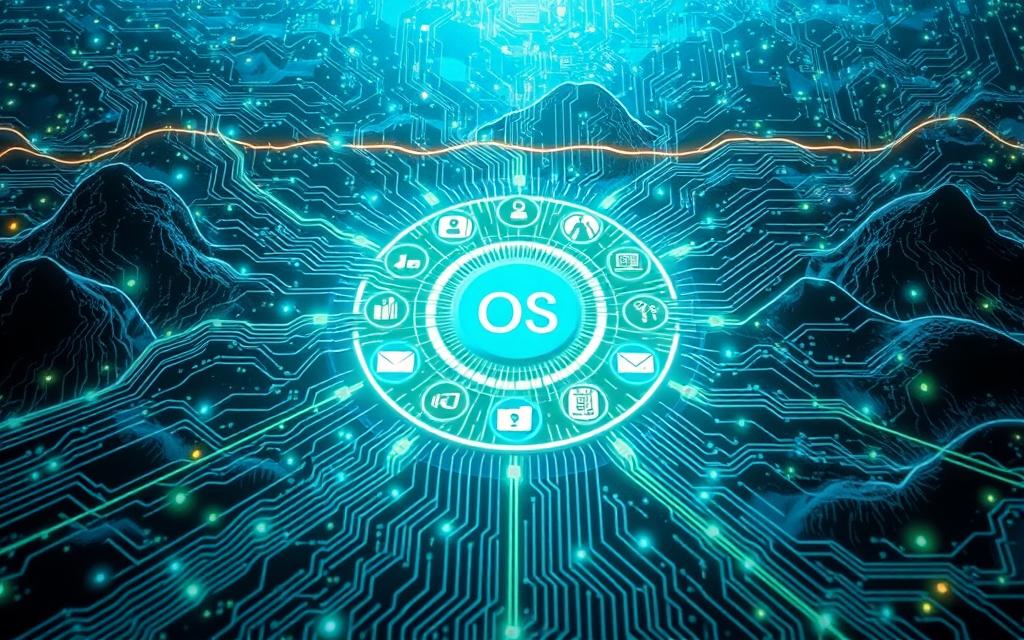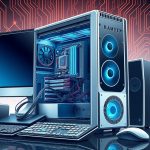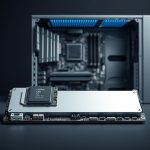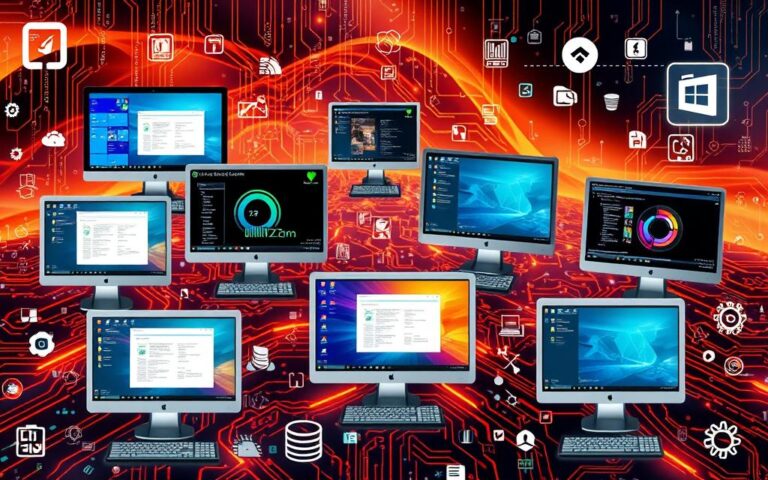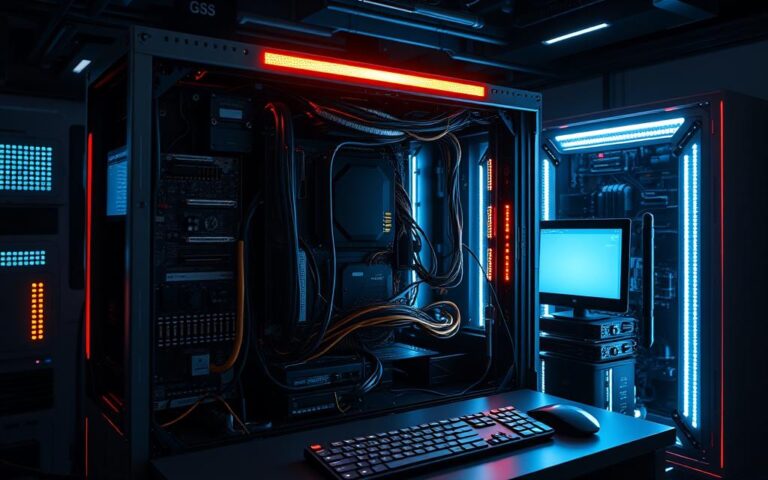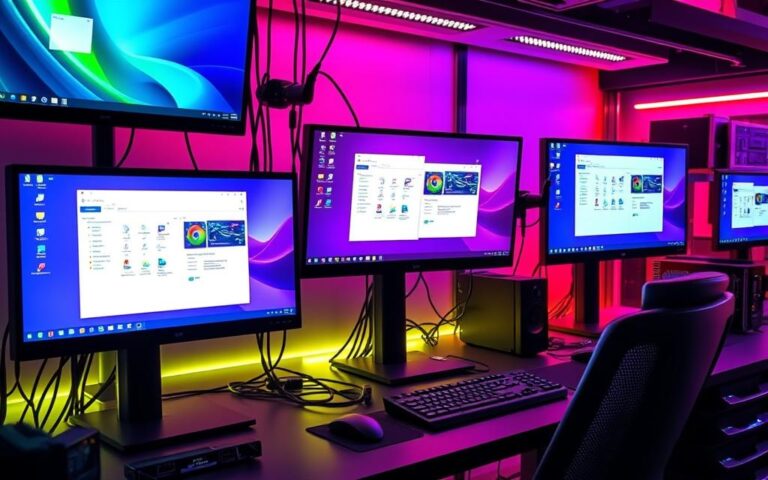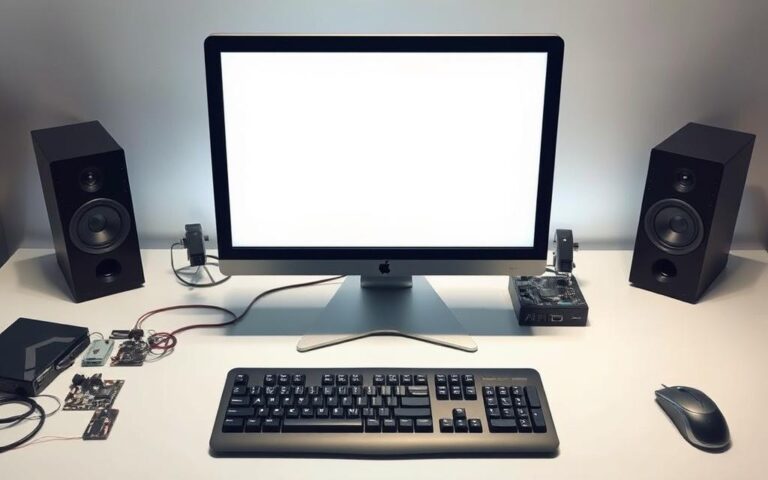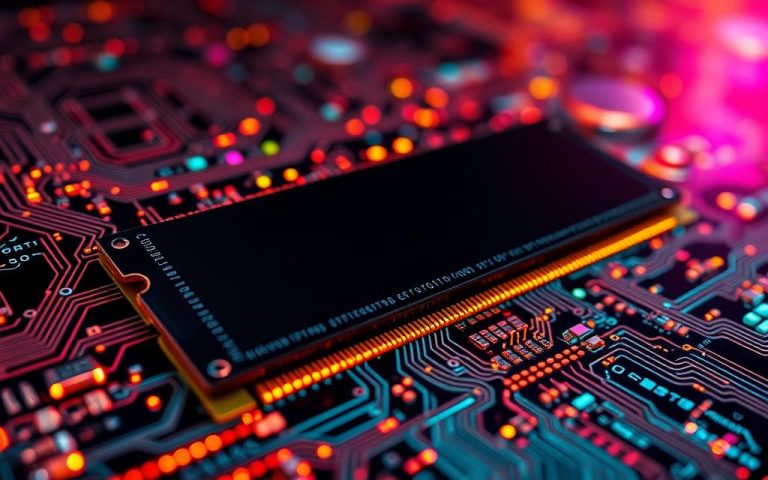The Role of an Operating System in a Computer: Purpose and Importance
An operating system is the core of a computer. It lets users interact with the computer and do various tasks. It manages the computer’s hardware and software, so users can run apps and access data.
The role of an operating system is huge. It’s where users create, communicate, and innovate. Every computer has an operating system at its heart. It’s key to making the computer work well.
The operating system connects the user to the computer’s hardware. It manages memory, tasks, and devices. It makes sure the computer works smoothly, making it vital for modern computing.
The operating system is the base for all computer apps and services. It offers a safe and stable place for users to work. As computers become more important, so does the operating system. It’s essential for a reliable and secure computing experience.
Understanding the Core Purpose of Operating Systems
Operating systems manage computer hardware and run application software. They control hardware like memory, CPU, and storage. Key functions include managing processes, memory, files, and input/output.
Over time, operating systems have evolved. Now, we have different types like single-user and multi-tasking systems. Their main goal is to manage hardware and run software.
Key Features of Operating Systems
- Process management: managing the creation, execution, and termination of processes
- Memory management: managing the allocation and deallocation of memory for running programs
- File management: providing a file system for storing and retrieving files
- Input/output management: managing input/output operations between devices and programs
Operating systems connect hardware and software. They help programs run smoothly. Their main job is to provide a platform for software to operate.
Evolution of Operating Systems
Operating systems have changed a lot over the years. They’ve moved from simple to complex systems. Despite these changes, their core purpose remains the same.
| Operating System | Release Year | Key Features |
|---|---|---|
| MS-DOS | 1981 | Single-user, single-tasking |
| Windows 95 | 1995 | Multi-user, multi-tasking |
| Linux | 1991 | Open-source, multi-user, multi-tasking |
The Fundamental Architecture of Modern Operating Systems
Modern operating systems have a complex yet efficient design. They manage computer resources and offer services to apps. At the core is the kernel, linking hardware and software.
The kernel handles memory, tasks, and input/output. It’s key to the system’s function.
Device drivers talk to hardware like keyboards and networks. System libraries offer pre-written functions for common tasks. This makes app development easier.
Some key parts of modern operating systems include:
- Kernel: manages memory, processes, and input/output operations
- Device drivers: interact with hardware devices
- System libraries: provide pre-written functions for applications
Knowing how these parts work is vital for making efficient apps. By using the kernel, drivers, and libraries, developers can make apps that are fast and secure. Modern operating systems support a wide range of apps, from simple to complex.
The way these parts work together affects the system’s performance and security. As fundamental architecture keeps improving, we’ll see even better operating systems.
What is the Purpose of Operating System in Computer: A Complete Overview
An operating system’s main job is to manage computer resources like CPU time, memory, and I/O devices. It does this to make sure resources are used well and efficiently. This is done through resource management and allocation, where resources are given to different processes and apps.
Resource Management and Allocation
Resource management is key for an operating system. It makes sure resources are used well and effectively. This includes scheduling and controlling processes, deciding the order and resources given to each process.
Process Scheduling and Control
Process scheduling and control are vital for an operating system. They decide the order and resources for each process. This includes managing memory, so each process can run smoothly.
Memory Management Functions
Memory management is essential for an operating system. It ensures each process has the resources it needs. This includes allocating and deallocating memory, to avoid memory leaks and other problems.
| Function | Description |
|---|---|
| Resource Management | Manages computer resources, such as CPU time, memory, and I/O devices |
| Process Scheduling | Determines the order in which processes are executed and the amount of resources allocated to each process |
| Memory Management | Allocates and deallocates memory, as well as manages memory allocation and deallocation to prevent memory leaks and other issues |
Essential Components That Power Your Computing Experience
Several key components power your computing experience. These include the operating system, hardware, and software. They work together to make computing smooth and efficient. The operating system is vital in managing how hardware and software interact, ensuring the computer works well.
Some important components are:
- Central Processing Unit (CPU): The brain of the computer, responsible for executing instructions and performing calculations.
- Memory (RAM): Temporary storage for data and applications, allowing for fast access and processing.
- Storage Drive: Permanent storage for data, programs, and the operating system.
- Input/Output Devices: Allow users to interact with the computer, such as keyboards, mice, and monitors.
These components together offer a full computing experience. The operating system manages their interactions, making sure the computer works well. A good operating system makes the computer stable and secure, perfect for running apps and accessing data.
Efficient management of system resources is key for a smooth experience. The operating system is important in managing resources like memory and CPU time. It ensures apps run fast and efficiently, making the computer interactive and responsive.
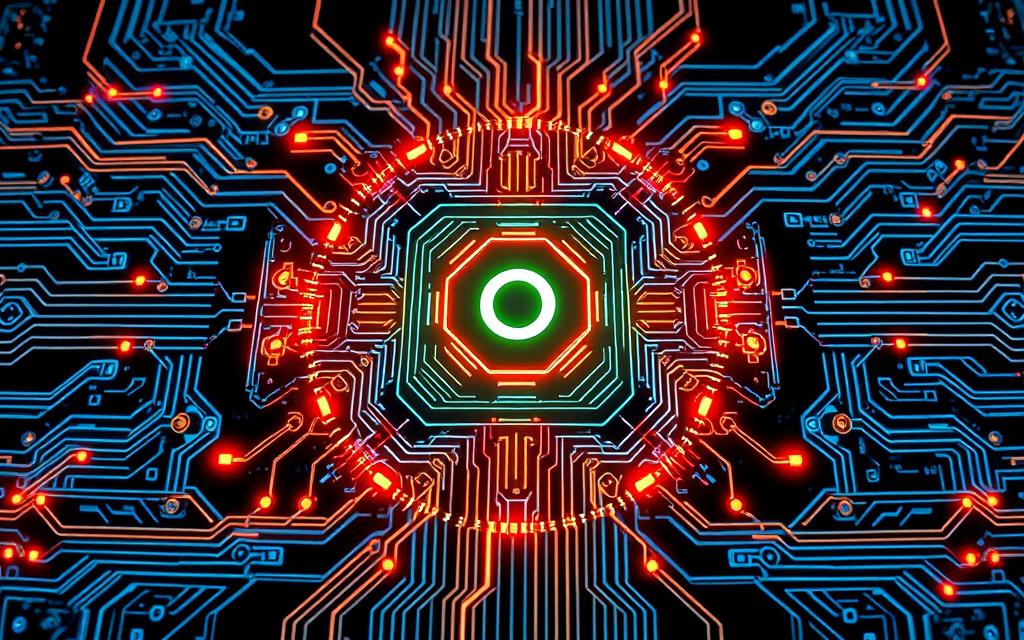
In conclusion, the essential components are vital for a seamless computing experience. The operating system, hardware, and software work together. Efficient management of resources is critical for a smooth experience. Understanding these components shows how important a well-designed operating system is for a stable and secure computing environment.
| Component | Description |
|---|---|
| Operating System | Manages and coordinates interactions between hardware and software |
| Hardware | Provides the physical components for computing, such as CPU, memory, and storage |
| Software | Provides the applications and programs that run on the computer |
The Role of Operating Systems in Device Management
Operating systems are key in managing devices like keyboards and printers. They make sure devices work well and efficiently. This is done through input/output device control, which helps the operating system manage device interactions.
Driver management is also vital. It lets the operating system talk to hardware devices. This makes it easier for users to handle their devices. Plus, peripheral device integration lets users connect and use devices like USB drives and cameras.
- Improved device performance and efficiency
- Enhanced user experience
- Increased productivity
- Better device security
In conclusion, operating systems are essential for device management. They ensure devices work well and efficiently. By providing a standard way for apps to access devices, they make managing devices easier for users.
| Device Management Aspect | Description |
|---|---|
| Input/Output Device Control | Manages and coordinates interactions between devices |
| Driver Management | Enables the operating system to communicate with hardware devices |
| Peripheral Device Integration | Allows users to connect and use various devices |
Security Features and User Protection Mechanisms
Operating systems have many security features to keep user data safe. They stop unauthorized access to computer resources. This includes access control, encryption, and firewalling.
These security features help prevent cyber threats. They protect users from harm. By using these features, operating systems keep user information safe.
Some important user protection mechanisms are:
- Access control: limits access to authorized users and processes
- Encryption: keeps data safe from unauthorized access
- Firewalling: blocks unwanted network traffic
These mechanisms are key to keeping user data secure. Operating systems are vital in providing them. For more on how operating systems use cookies, visitcookie policypages.
Operating systems also offer regular updates and patches. These fix vulnerabilities and boost security. Keeping up with security patches helps keep the operating system safe.
File Management and Storage Organisation
Effective file management and storage organisation are key to a good operating system. They help users create, manage, and find files and folders easily. The operating system offers a hierarchical file system for organising data in a clear way.
The role of file management and storage organisation is huge. They affect how well the system works. With a strong file system architecture, data is stored and found fast and safely.
Key Aspects of File System Architecture
- File system hierarchy
- File naming conventions
- Directory structure
Data organisation methods are also very important. They help users sort and order their data, making it simpler to manage. Storage optimisation techniques are key too, as they boost storage efficiency and prevent data loss.
Best Practices for Storage Optimisation
To keep data safe and efficient, follow these storage optimisation tips. Regular backups, cloud storage, and using storage optimisation techniques like compression and deduplication are good practices.
Multitasking and Process Management Capabilities
Operating systems can handle multitasking, running many processes at once. This lets users do several tasks at the same time. It makes the system work better and faster.
Good process management is key. It helps all these processes share computer resources well.
Today, computers need to do lots of things fast. They must handle many tasks well without slowing down. This is done with smart process management like setting priorities and schedules.
Some big pluses of multitasking and process management are:
- Systems work better and faster
- Users get more done and work more efficiently
- Users have a better experience
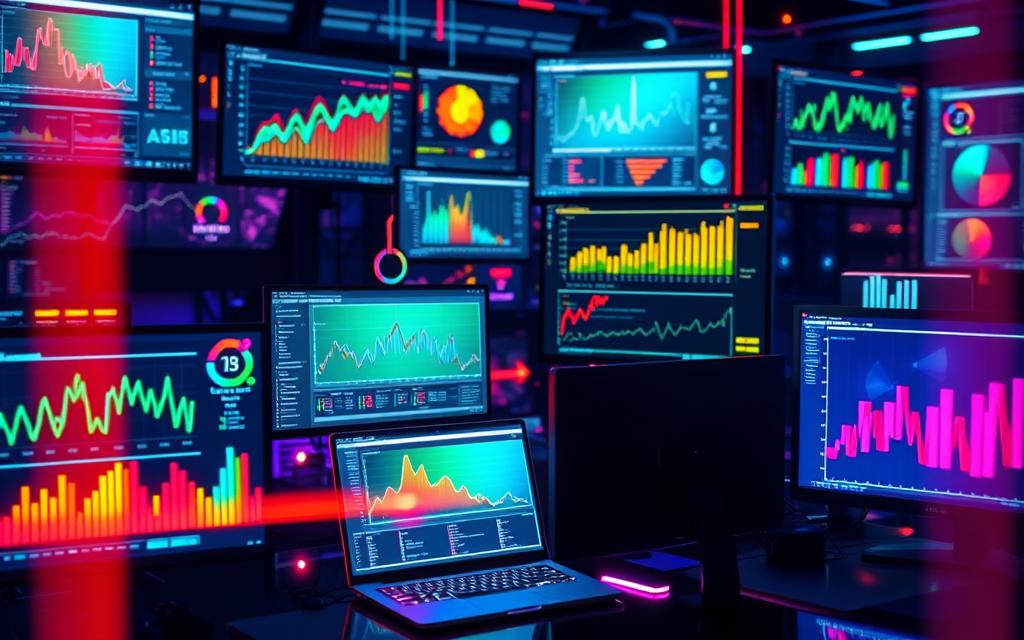
In short, multitasking and process management capabilities are vital today. Knowing how they work helps users get the most out of their computers.
User Interface and Experience Enhancement
The user interface is key to a good computer experience. A well-designed user interface can greatly improve how users feel about a system. The graphical user interface evolution has made interfaces more intuitive and friendly.
Experience enhancement is also about accessibility features. These features help users with disabilities use the system. They include screen readers, keyboard-only navigation, and high contrast modes.
Key Features of Modern User Interfaces
- Intuitive navigation and menu systems
- Customizable layouts and themes
- Real-time feedback and notifications
These features make operating systems easy and fun to use. They help users interact smoothly with the system and access different features and services.
Network Management and Connectivity Functions
Effective network management is key for smooth connectivity and communication today. Operating systems manage and coordinate network communications. This lets users share and access resources across the network. Internet protocol management ensures data is sent efficiently and securely.
Network resource sharing is also important. It lets many devices share files, printers, and more. This is vital in our connected world for collaboration and sharing information. Operating systems help users connect to the internet and access cloud services.
Key Benefits of Network Management
- Enhanced collaboration and information sharing
- Improved network security and reliability
- Efficient use of network resources
- Simplified network configuration and management
Network management also supports remote access and VPNs. These features let users access the network from anywhere. They keep the network secure and reliable. Operating systems combine network management and connectivity functions for modern computing.
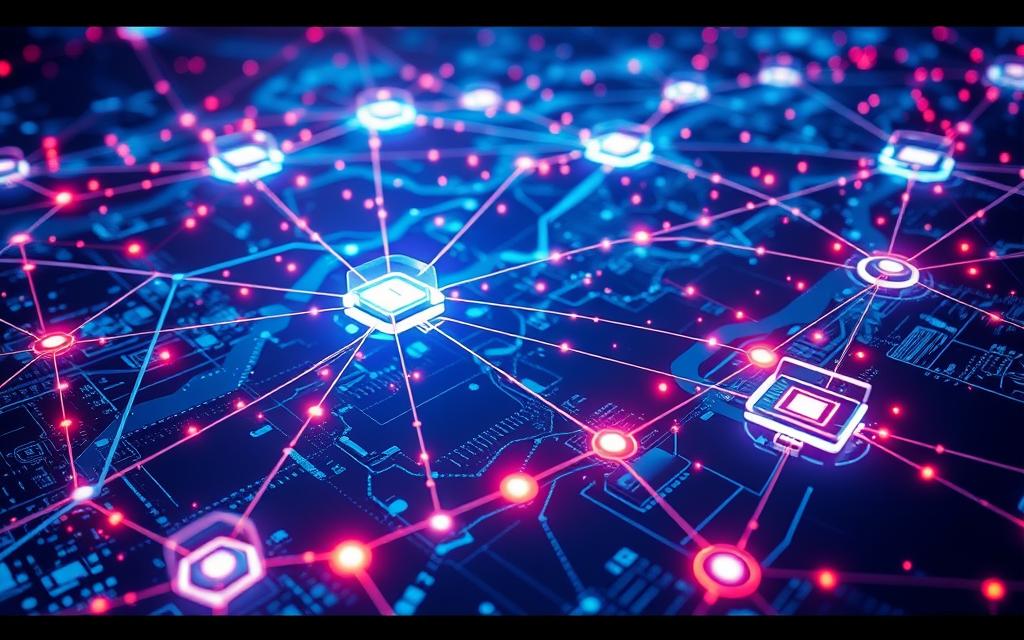
The Impact of Operating Systems on Modern Computing
Operating systems have greatly influenced modern computing. They’ve made it possible to create complex technologies like cloud computing and artificial intelligence. These advancements have changed how we live and work, opening up new opportunities for growth.
Operating systems have also shaped the modern computing world. They’ve given developers a platform to create new apps and services. This has led to new industries and jobs, boosting the economy.
Some key areas where operating systems have made a difference include:
- Cloud computing: They’ve enabled cloud computing, changing how we store and access data.
- Artificial intelligence: They’ve provided a base for AI, used in everything from virtual assistants to self-driving cars.
- Internet of Things: They’ve helped connect different devices and systems, creating the Internet of Things.
In summary, operating systems have had a big impact on modern computing. They’ve helped develop new technologies and changed our daily lives. As technology keeps evolving, operating systems will likely play an even bigger role in modern computing‘s future.
Conclusion: The Indispensable Role of Operating Systems in Modern Technology
Operating systems are key in modern tech, linking hardware and software smoothly. They act as a bridge between the physical and virtual worlds. They manage resources, run apps, and make computing easy for users.
From mainframes to smartphones and IoT, OSs have grown a lot. They are vital for innovation, better user experience, and keeping our digital world safe. As tech advances, the need for strong OSs will keep growing, making them a must in our digital lives.
FAQ
What is the core purpose of operating systems?
Operating systems manage computer hardware and software. They let users interact with the computer and do various tasks. They act as a bridge between hardware and software, making it easier for applications to run and for users to access computer features.
How have operating systems evolved historically?
Operating systems have changed a lot over time. They started with simple command-line interfaces and now have graphical user interfaces. They’ve added multitasking, networking, and better security, making computing better for everyone.
What are the fundamental components of modern operating systems?
Modern operating systems have a few key parts. The kernel is at the heart, managing resources and services for apps. Device drivers talk to hardware, and system libraries help apps use system functions.
How do operating systems manage computer resources?
Operating systems manage resources like CPU time, memory, and I/O devices. They do this through resource management, scheduling, and memory control. This ensures computers run smoothly and efficiently.
What security features do operating systems provide?
Operating systems have many security features. They include access control, encryption, and firewalls. These help keep computers and data safe from threats.
How do operating systems manage files and storage?
Operating systems handle files and storage well. They use file systems and storage techniques to help users manage files. This makes data easy to store and access.
What are the key multitasking and process management capabilities of operating systems?
Operating systems are great at multitasking. They let many processes run at once, sharing resources. This makes computers faster and more efficient.
How do operating systems enhance the user interface and experience?
Operating systems have made computers easier to use. They’ve added graphical interfaces and accessibility features. This has made interacting with computers more intuitive and enjoyable.
What are the network management and connectivity functions of operating systems?
Operating systems manage networks and connectivity. They handle internet protocols and resource sharing. This makes it easy to communicate and access online resources.
How have operating systems impacted modern computing?
Operating systems have changed computing a lot. They’ve enabled new technologies like cloud computing and artificial intelligence. They’ve made it easier for us to use and benefit from technology every day.

